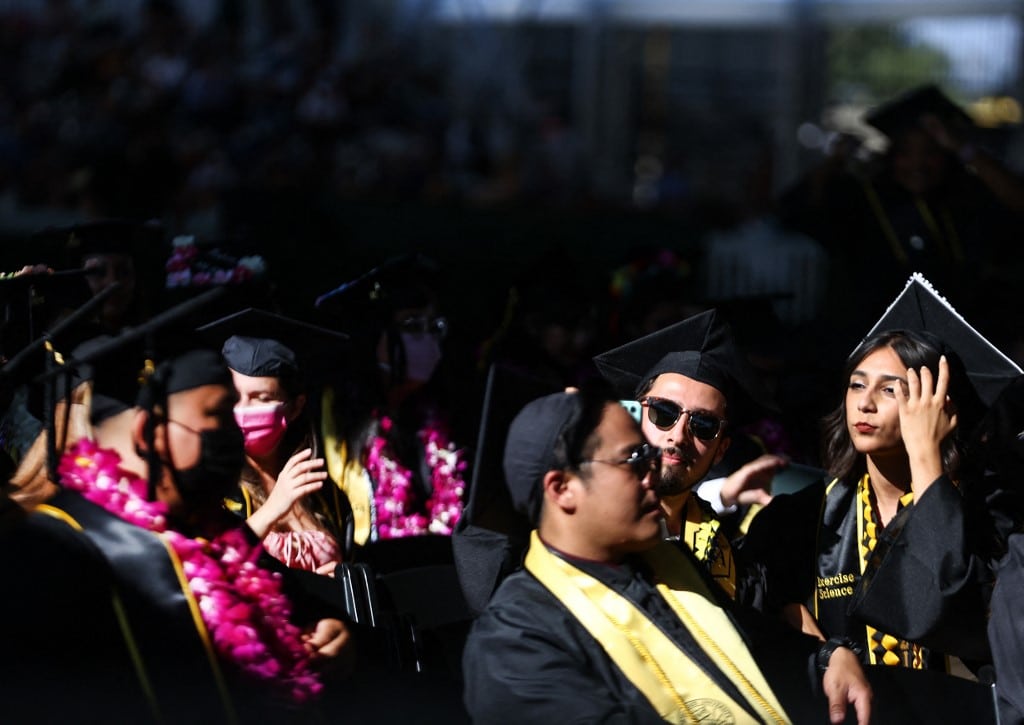
International students on UK taught master’s courses will be banned from bringing family members with them as dependants, PIE News reports.
Only students on postgraduate courses currently designated as research programmes, which includes PhD students, will be able to bring dependants under new rules set out by home secretary Suella Braverman.
This makes it harder for international students to bring their families over when studying in the UK as the government limit dependant visas for these group of students.
Not long ago, the Department of Education, the Home Office and the Treasury have finalise plans that prevent master’s students on one-year courses from bringing family members to the UK with them, reports the Financial Times.
Statistics from the Home Office published in February 2023 showed that 490,763 sponsored study visas were granted to main applicants in 2022, the highest number since comparable records began in 2005.
This was 29% more than the year before and 26% higher than the number granted in 2019, the last pre-pandemic year.
Student visa holders were accompanied by a record 135,788 dependants — almost nine times the number that entered the country in 2019 and more than the total for the previous six years combined.
Limiting dependant visas: “Impossible” for many students to study in the UK
Not everyone is enthusiastic about the government’s response to restricting the number of dependant visas for international students.
Justine Greening, the former Conservative education secretary, attacked Rishi Sunak’s proposals to limit the number of international students at British universities, arguing that the move could have a “severe negative impact” on the country, reports The Guardian.
In a letter co-signed by 12 university vice-chancellors, Greening urged the education secretary, Gillian Keegan, to make the case against new restrictions on students.
The new restriction is said to be supported by Sunak in the wake of record levels of inward migration.
“Reducing the number of international students could have a severe negative impact on Britain’s economy, productivity, and our world-leading universities,” Greening said in the letter.
“The obvious cultural contribution and enrichment of UK students’ learning experience is clear, as is the knowledge exchange and research contribution that international students bring to our renowned higher education sector.”
Lil Bremermann-Richard, CEO of Oxford International Education Group, told The PIE News that limiting dependant visas will make it “impossible” for many students to study in the UK.
“If we are truly committed to attracting diverse talent, we need to take into consideration the financial costs that could be involved to secure care alternatives, or to travel back and forth,” she said.
“We also need to remember that students have lots of options; if presented with a choice of studying in the UK and leaving their dependants behind, or studying elsewhere, like Canada for example, with their family, many will choose the latter.

Justine Greening, the former Conservative education secretary, attacked Rishi Sunak’s proposals to limit the number of international students at British universities, arguing that the move could have a “severe negative impact” on the country. Source: Daniel Leal/various sources/AFP
Is it easier for international students to bring their family to other countries?
Living alone in a new country can be a daunting experience, so it’s not surprising to see international students bring their parents when studying abroad.
After all, research shows that a good parent-child relationship can satisfy an individual’s basic emotional needs, such as a sense of belonging, leading to positive academic exploration and pursuit.
One Chevening Scholar talks about her experience studying abroad: “I have professional experiences that I never had before, and many doors were opening, but homesickness and loneliness are also challenges that I ended up having to face daily.”
Having your wife, husband, children and parents around can help students overcome such challenges — but do many countries allow this?
Let’s dive deeper into the regulations pertaining to dependant visas for international students:

Dubbed the “Land of Dreams”, the US is undeniably a popular study-abroad destination. While it’s possible to bring family with you, the dependant visa can take up to 90 days for approval (or rejection) by the US Citizenship and Immigration Services (USCIS). Source: Mario Tama/Getty Images North America/Getty Images/AFP
1. US
It is possible to bring your family to the US on a student visa, but there are strict regulations that you must follow.
Plus, the process can be time-consuming. On average, the dependant visa can take up to 90 days for approval (or rejection) by the US Citizenship and Immigration Services (USCIS).
How to apply?
First, you need an I-20 form. Your uni would require documents like a copy of your passport and additional financial statements showing how you can financially support your dependants to issue your I-20 form.
Your best point of contact would be the international student office or the international admissions team.
With these forms, the visa category your family members should apply for depends on your relationship with them. Look out for the following:
- If you want to bring your spouse or children to the US, add an F-2 visa application for every family member. The F-2 visa is a derivate visa category, meaning you can apply for them as you apply for your student visa and the length of stay allowed will be equal to yours.
- If you want to bring a parent, sibling, fiance or children over 21 to the US on a student visa, these individuals must apply for a B-2 visitor visa. These visas allow family members to stay in the US for a maximum of six months.

If you’re ever in doubt about how to bring your family over to the US on an American student visa, the US International Student and Scholar Services website is one of your best sources of info. Source: Justin Sullivan/Getty Images North America/Getty Images/AFP.
How much does it cost?
The US International Student and Scholar Services (ISSS) requires evidence of funding of US$4,500 annually for a spouse and US$2,500 annually per child to issue an I-20 form.
While this is the minimum amount required, note that the cost of living is rising in the US. Research the realistic estimate of funds needed to cover rent, food, and other expenses.
Dependants of international students on a F-2 visa are not permitted to work and will not be provided with a social security number.
What’s different after COVID-19?
Despite COVID-19, the rules have not changed. You may, however, spend more time gathering all the required documentation, given consulate closures and local lockdowns.
Speak to your uni about the vaccine requirements that may extend to your dependant. In addition to the COVID-19 vaccine, colleges and K-12 schools typically require proof of multiple immunisations such as meningitis, polio, MMR and hepatitis B.

Immigration, Refugees and Citizenship Canada facilitates the arrival of immigrants into the country. Source: Cole Burston/AFP
2. Canada
Yes, it is possible to bring your family with you when you head to Canada to study. There are many moving parts and things to consider, so let’s break it down.
In any case, always refer to the Immigration, Refugees and Citizenship Canada for the latest updates.
How to apply?
First, consider what visa status best fits each family member’s needs.
If they are visiting, they can apply for a visitor visa. This is perfect if your parents are coming over for your graduation ceremony or your spouse or common
A study permit is usually held by your minor children (aged up to 18 or 19, depending on your province or territory) who study in Canada.
If your spouse or partners want to work in Canada, they may be eligible for a work permit if you study full-time at an eligible institution.
When submitting your application, family members need to show proof of your student status (by way of an admission letter, current enrollment letter, or transcript) and an invitation letter — written by you — outlining your family’s reason for visiting Canada.
How much does it cost?
Your family needs to show proof of adequate funds to support their stay in Canada.
In addition to the minimum funds you need as a student, family members should generally show 4,000 Canadian dollars for the first family member, 3,000 Canadian dollars for each additional family member, and slightly more in Quebec.
What’s different after COVID-19?
Most international students have been able to enter Canada since Oct. 20, 2020. Still, Canadian COVID-19 travel restrictions for other travellers are changing rapidly.
That’s why it’s important to stay on top of the latest news on Canadian travel restrictions as you prepare to bring any family or dependants to the country.

Australia is the third most popular destination for international students. Source: Robert Wallace/AFP
3. Australia
An Australian student visa is a temporary visa and lets you and your family stay in Australia for the length of your course, according to Times Higher Education.
How to apply?
When applying for your Australian student visa, the main applicant you can include is your family member, like your parents or children. Once your visa is approved, your family can migrate together to Australia.
Alternatively, you can apply for a subsequent entrant visa. Some families decide for the main applicant to migrate first and organise the basics, such as finding a place to live, securing work, or selecting schools for the children. The family can follow afterwards on subsequent entrant visas.

The Department of Home Affairs is the Australian government’s interior ministry with responsibilities for national security, law enforcement, and immigration, to name a few. Source: William West/AFP
How much does it cost?
The visa application charges for a student visa are 630 Australian dollars for the main applicant, 470 Australian dollars for additional applicants 18 and over, and 155 Australian dollars for children under 18.
Additional fees apply if you engage a professional migration service to assist you.
The processing time for student visas is about three to five months.
What’s different after COVID-19?
While the pandemic did disrupt travel for international students, the Australian government has eased travel restrictions.










